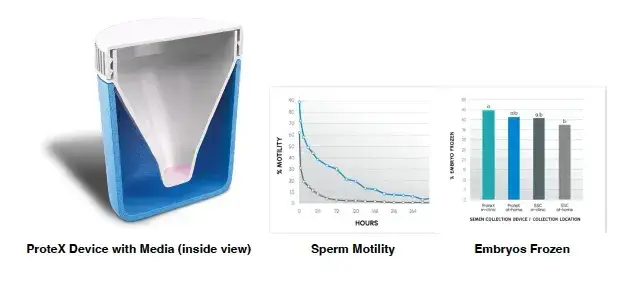AT-HOME SPERM BANKING
In today’s world, where technology intersects with personal health in increasingly innovative ways, at-home sperm banking has emerged as a convenient option for those looking to preserve their fertility or contribute to family planning. Gone are the days when sperm banking required multiple trips to a clinic or hospital; now, individuals can collect and store their sperm in the comfort of their own homes. However, with this convenience come important considerations regarding risks and benefits.
The Convenience of At-Home Sperm Banking
Traditionally, sperm banking involved visits to a fertility clinic or hospital, where individuals had to provide samples in a clinical setting. This process often required scheduling appointments, dealing with potential discomfort or embarrassment, and sometimes navigating logistical challenges. At-home sperm banking eliminates many of these hurdles by allowing individuals to collect their samples in a familiar and private environment.
With at-home sperm banking kits, the process has become more straightforward and more accessible. Our kit, which we call the Urgent-Pak, includes detailed instructions for collecting and preserving the sample and packaging materials for safe transportation to our storage facility. By empowering individuals to take control of the process, at-home sperm banking offers a level of convenience and autonomy that was previously unavailable.
Trade-offs to Consider
While at-home sperm banking offers convenience, it’s essential to consider the potential Trade-offs and limitations associated with this approach. One of the primary concerns is the quality of the sample stored. Unlike in a clinical setting where trained professionals can ensure rapid processing of the specimen under controlled temperatures, individuals may face challenges in obtaining high-quality sperm at home.
Factors such as improper collection techniques, contamination of the specimen, variabilities in transportation to the laboratory for processing, or inadequate storage could affect the viability of the sperm sample. Additionally, without the guidance of a healthcare provider, individuals may overlook important considerations related to their reproductive health, such as underlying medical conditions or lifestyle factors that could impact fertility. Let us address several of these factors individually and discuss how New York Cryo mitigates the potential effect on the semen specimen.
• Improper Collection Technique: Our UrgentPak Kit includes easy-to-follow instructions. We also provide more detailed instructions on Specimen Collection and At-Home collection online.
• Specimen Contamination: When cultured, at least two-thirds of semen specimens showed the presence of various bacterial species in the semen sample. Our UrgentPak kit includes an antibacterial wipe to clean the head of the penis prior to giving the specimen. We provide a media that is added to your specimen that contains an antibiotic. We also culture the sample when we receive your specimen and freeze the sample with an antibiotic-containing solution. Lubricants are discouraged since many contain both bacteria and substances that kill sperm.
• Transportation Variabilities: The primary concerns with transporting a specimen to the laboratory are sperm motility, pH changes, and temperature. To mitigate these changes, New York Cryo provides Overnight next-morning delivery of the specimen and uses the ProteX container, which has been shown to provide 48 hours of specimen stability. The ProteX container is an FDA-listed Class 1 device. Clinical and basic science research studies can be found here ProteX. Motility always decreases with time from production. However, the use of the ProteX container significantly maintains motility during transport, as shown in the graph below (center inset). Also, compared to a standard specimen container (SSC), the ProteX device results in an equal or even an increased number of embryos used in assisted reproductive procedures (second graph below).

-
- Thermal Protection
- 360° thermal barrier with double-wall construction reduces temperature fluctuations and minimizes thermal exchange.
- Reduces the surface exposure area 95% for 10x better thermal control than a specimen cup.
- Slows the cooling rate to 0.5° F per minute, allowing the sample to naturally drive its own temperature gradient.
- Prevents a 25-30° F temperature drop within the first 10 minutes, as seen in the specimen cup.
- Long-Term Biological and pH Protection
- A pre-calculated 1 mL of media with HEPES added prior to collection reduces shifts in pH and promotes osmoregulation, the process of balancing fluid intake.
- The healthiest sperm sample possible is stabilized at a high motility for at least 48 hours after collection.
- Spill-proof Protection
- A properly closed spill-proof lid keeps samples safely contained and guards against accidental leaks during transportation handling.
- Thermal Protection
• Getting the Specimen to us: If the patient is located near our office, the patient, a family member, or their delegate can deliver the specimen directly to our lab. If they cannot get the specimen to our office, we offer pickup service if the patient is located in our catchment area and overnight courier service the next morning if the patient is located outside our catchment area.
Another consideration is the reliability of at-home storage facilities. While reputable sperm banks adhere to strict protocols for sample preservation and security, there may be variability in the quality of storage offered by different providers. New York Cryo has been securely storing sperm and testicular tissue since 1997. We are licensed by New York State as a Reproductive Tissue Bank (ID: 535), Clinical Laboratory (PFI:4992), and registered with the FDA (FEI: 3003422359). Please see our Spern Banking FAQs
Benefits of At-Home Sperm Banking
Despite the potential risks, at-home sperm banking offers several benefits that make it an attractive option for many individuals. Firstly, the privacy and convenience of collecting a sample at home can significantly reduce barriers to sperm banking, particularly for those who may feel uncomfortable or embarrassed in a clinical setting.
Additionally, at-home sperm banking can be particularly beneficial for individuals who anticipate the need for multiple samples over time. Whether due to medical treatments that may impact fertility or personal circumstances such as delayed family planning, having the flexibility to collect and store samples as needed can provide peace of mind and greater control over one’s reproductive future.
Moreover, at-home sperm banking may be more cost-effective for some individuals compared to traditional clinic-based options. While prices can vary depending on the specific services requested, eliminating the need for office visits and associated fees can result in significant cost and time savings.
Conclusion
At-home sperm banking represents a modern and convenient approach to preserving fertility and supporting family planning goals. By allowing individuals to collect and store sperm samples in the comfort of their own homes offers a level of autonomy and accessibility that was previously unavailable. However, it’s essential for individuals considering at-home sperm banking to weigh the convenience against potential trade-offs and to choose a reputable sperm bank, like New York Cryo, that prioritizes sample quality and security. Ultimately, informed decision-making and careful consideration of all factors are key to maximizing the benefits of at-home sperm banking while minimizing potential drawbacks.
If you are interested in At-Home Sperm Banking, please contact us at New York Cryo by our online text or call us directly at 516-487-2700. We can also be reached by email (FrontDesk@nycryo.com).
New York Cryo has Affordable Pricing that is the best in the New York Metropolitan Area. If you find sperm storage for less, let us know! We will meet or beat any one-year verified storage cost from a NY State-licensed sperm bank storing sperm in the New York Metropolitan Area.

